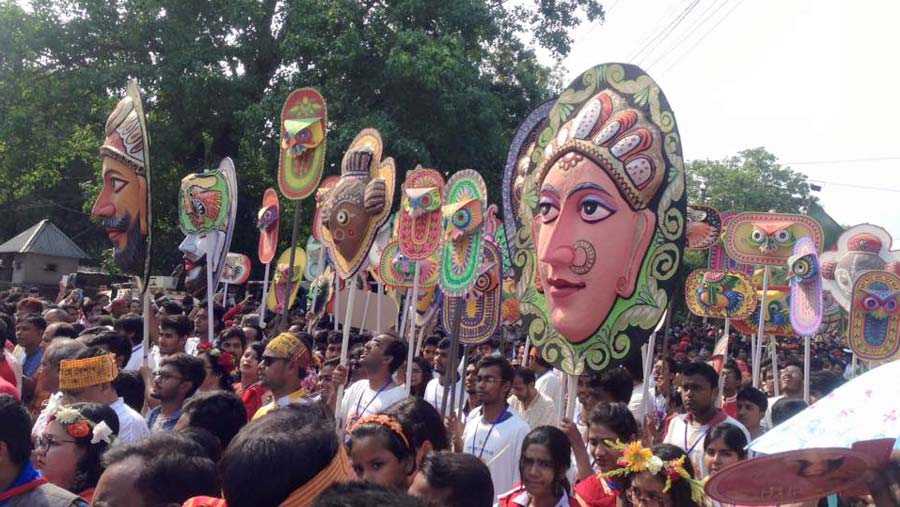


Pohela Boishakh, the first day of Bangla calendar, was celebrated amid traditional festivities and enthusiasm across the country on Saturday (Apr 14). The festivities began at dawn with the artistes from Chhayanaut welcoming the day with Tagore’s famous song ‘Esho hey Boishakh, esho, esho (come O Boishakh, come)’ under the banyan tree at the Ramna Park.
People of all walks of life gathered at different popular spots since the dawn in capital Dhaka and elsewhere across the country to welcome the Bangla New Year, 1425. Although the celebrations in the capital were smooth throughout the day, a hailstorm disrupted the rhythm in many areas in the afternoon. As the hailstorm came down in the city around 5.15 p.m., outdoor revellers were seen leaving the venues of different programmes to safety. Many events, including concerts, were also cancelled due to rain.
The day was a public holiday. Thousands of people, especially the youths wearing traditional dresses, thronged traditional venues at different parts of the capital, including Ramna Park, Suhrawardy Udyan, Central Shaheed Minar, Dhaka University, Shahbagh, Dhanmondi Lake, Hatirjheel and different other spots to celebrate the day.
The celebrations of Pahela Baishakh have become an integral part of Bangalees since it began over six centuries back.
Mughal Emperor Akbar introduced the Bangla calendar in 1556 of the Gregorian calendar in a bid to streamline the timing of land tax collection in the then ‘Subah Bangla’ region, the much of which falls under Bangladesh.
On the occasion, President Md. Abdul Hamid and Prime Minister Sheikh Hasina issued separate messages conveying their New Year's greetings to the people of the country and all Bengla-speaking people across the world, local media reports said.
Traders and shopkeepers across the country opened ‘Halkhata’ (new book of accounts) and entertain customers and visitors with sweets on the first day of the New Year as part of the tradition and culture.
Students of the Institute of Fine Arts of Dhaka University brought out a ‘Mangal Shobhajatra’ (procession of good wishes) around 10 am as part of the festival. The procession ended on the DU campus after parading different roads via Shahbagh.
However, no one was allowed to wear mask during the procession.
Men wearing panjabi-pyjama, women attired in saris with red borders and children in colourful dresses all thronged traditional Baishakhi Mela (fair) and other cultural functions in the city and elsewhere across the country.
People partook of ‘Panta Bhat (watery rice)’ with fried hilsa, lentils, green chili and onions at home, restaurants and fairs following the rich tradition of Bangla culture.
State-owned Bangladesh Television and Bangladesh Betar and the private TV channels aired special programmes on the day.
Socio-cultural organisations also celebrated the day with elaborate programmes. Bangla Academy, Shilpakala Academy and Nazrul Institute organised separate cultural programmes to welcome the New Year.
Extensive security measures were in place in the city and elsewhere across the country for smooth celebrations of the day. There were several watchtowers and adequate searchlights in Ramna Batamul area. Besides, a number of mobile courts were deployed in Ramna and Dhaka University areas to avoid any act of sabotage.